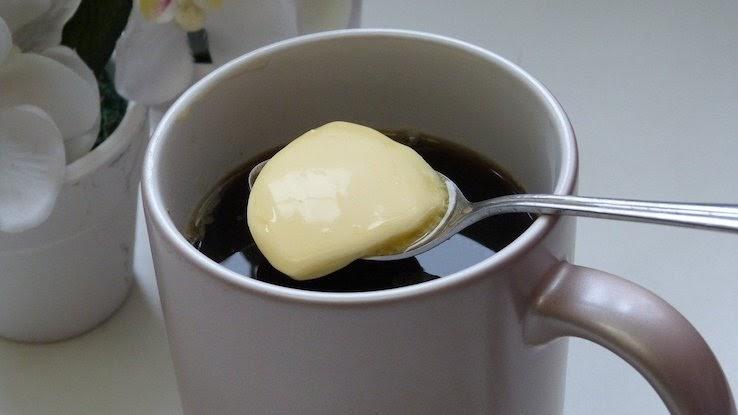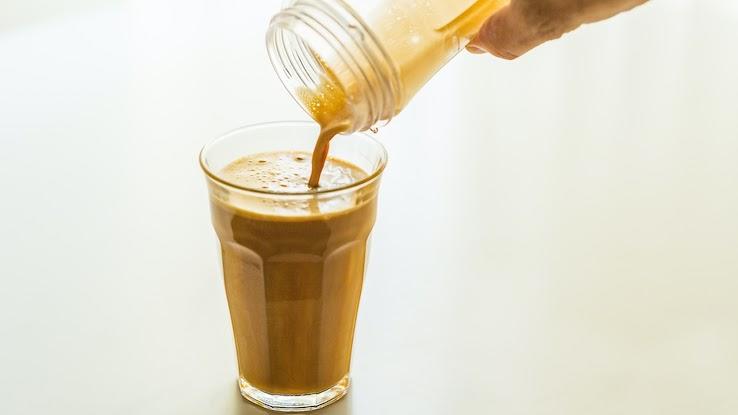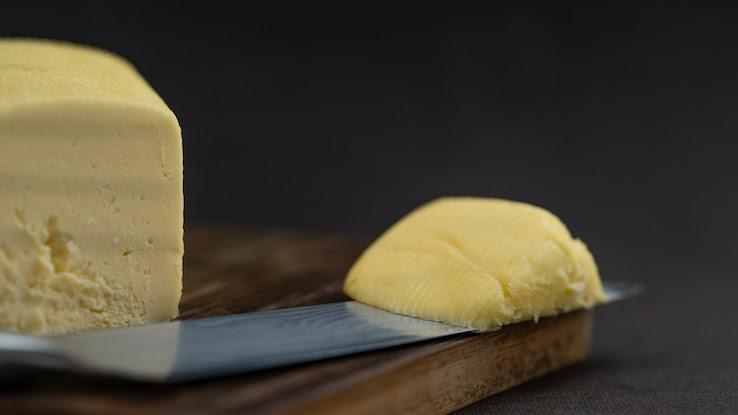
Bulletproof coffee is a breakfast replacement coffee drink. You read that right: thanks to all of its added calories, it’ll replace your whole breakfast, not just your cup of Joe. Those extra calories come from the butter and MCT oil that’s mixed into the beverage, and the name stems from David Asprey, creator of the “Bulletproof Diet.”
Asprey’s specific recipe calls for two cups of coffee, two tablespoons of grass-fed, unsalted butter (or ghee), and between one and two tablespoons of MCT oil. Mix them all in a blender and you’ve got yourself a bulletproof coffee. Now, people use the term bulletproof coffee for any coffee-butter-oil drink that uses roughly the same ratio of each ingredient. It’s popular with people on keto, paleo, and other low-carb diets.
Despite the recent spike in its popularity, bulletproof coffee isn’t really a novel idea. For example, Indian and Himalayan cultures have been mixing butter into their coffee for hundreds of years. Ayurveda, a 3,000-year-old Indian natural system of medicine, also has a drink called po cha, which is fermented black tea and salted yak butter.
Centuries ago, the idea was that adding all this butter and MCT oil to coffee had certain health benefits, from promoting weight loss to boosting mental clarity. Today, those promoting Bulletproof coffee are making those same claims. But is bulletproof coffee actually any good for you?
Bulletproof Coffee Might Have Some Benefits
1. The individual ingredients all have health benefits
The individual ingredients of bulletproof coffee each have their own health benefits. The caffeine in coffee can boost your energy levels. Research has shown that coffee contains a lot of antioxidants and, perhaps surprisingly, it can promote weight loss by speeding up your metabolism as well as reduce your risk of some serious diseases.
Grass-fed, unsalted butter has some health benefits as well. It has a high quantity of some powerful antioxidants and omega-3 fatty acids, which have anti-inflammatory properties. MCT oil can help protect your heart, reduce inflammation, and have a positive impact on weight management.
Be aware, however, that just because the three ingredients in bulletproof coffee have some health benefits does not mean that mixing the ingredients together is a healthy choice.

2. It is keto diet-friendly
Ketogenic (keto) diets are high in fat, low in carbs, and full of protein. So, a high-fat drink like bulletproof coffee can easily help those on the keto diet reach their ketosis goals. Furthermore, MCT oil helps people reach ketosis in a healthy way because it is relatively easy to transform this oil’s fat into ketones. In this way, it can also reduce the “keto flu” symptoms that sometimes happen to people who are just starting a keto diet.
3. It could help you lose weight
Adding high-fat ingredients, like butter and MCT oil, to coffee makes it a more filling beverage, so you’re likely to feel full after drinking a cup. All those extra calories and fats is why bulletproof coffee can work well as a breakfast replacement.
In terms of weight loss, when you feel full, you eat less because you’re already satiated. So, the idea is that starting the day with a Bulletproof coffee can help you lose weight. As long as you are using it as a replacement for your breakfast and not an addition to your breakfast. Of course, there haven’t been extensive studies, but, in theory, it could be implemented into one’s diet.
The Not-So-Great Side of Bulletproof Coffee
1. It’s not the best breakfast replacement — nutritionally speaking
While bulletproof coffee might have enough fat and calories to make a person feel full, that doesn’t make it healthy. In fact, bulletproof coffee does not have a lot of nutritional value. It’s missing essential nutrients, including most vitamins and minerals as well as fiber and protein. If you’re a person that eats three meals a day, consuming bulletproof coffee as a breakfast replacement will mean that you decrease your nutrient intake for the day by about a third. And your body needs nutrients to function at its best.

2. You might gain weight instead of losing it
Starting the day with bulletproof coffee may not actually make you feel full. It is true that consuming fat can satiate a person and reduce their hunger. However, fat is not the only thing that contributes to fullness. Protein and fiber are also important elements of satiety.
Simply drinking a bulletproof coffee might not fill you up — and then you run into the danger of eating sooner than you would have had you eaten a healthy, balanced breakfast that included fat, protein, and fiber. In that case, if your butter-filled coffee does not fill you up and you end up eating even more, you’ll gain weight. Keep in mind that most bulletproof coffee recipes contain between 310-810 calories, depending on how much grass-fed butter and MCT oil you include.
3. Too much cholesterol and saturated fat does not do a body good
Bulletproof coffee is extremely high in saturated fat. Consuming too much-saturated fat can be a real health risk, as it can lead to an increased risk of heightened cholesterol and cardiovascular disease. High cholesterol in the long-term can cause a person to develop fatty deposits throughout their blood vessels and eventually make it hard for the blood to flow. This can lead to heart diseases like coronary artery disease and heart valve disease. Additionally, it can increase the risk of strokes and/or heart attacks.
The Verdict Is Clear
If you like the taste and immediate effects of drinking a bulletproof coffee, replacing your breakfast with a cup of it might be okay once in a while. However, making it an everyday thing probably isn’t the healthiest decision — and doing so might even lead to long-term health problems.
And, if your goal is to lose weight, try a healthy, balanced breakfast instead of bulletproof coffee. Something like a bowl of oatmeal and fruit with a side of coffee is a much better bet. That way, you’re filling yourself up with fat, protein, and fiber, not just adding a bunch of fat to your caffeinated beverage.
Resource Links:
- “Coffee consumption and health: umbrella review of meta-analyses of multiple health outcomes” via U.S. National Library of Medicine
- “A review of fatty acid profiles and antioxidant content in grass-fed and grain-fed beef” via U.S. National Library of Medicine
- “Medium Chain Triglyceride Oil Consumption as Part of a Weight Loss Diet Does Not Lead to an Adverse Metabolic Profile When Compared to Olive Oil” via U.S. National Library of Medicine
- “The Effect of Medium Chain Triglycerides on Time to Nutritional Ketosis and Symptoms of Keto-Induction in Healthy Adults: A Randomized Controlled Clinical Trial” via U.S. National Library of Medicine
- “Health effects of saturated and trans-fatty acid intake in children and adolescents: Systematic review and meta-analysis” via U.S. National Library of Medicine
- Bulletproof Diet (official website)





